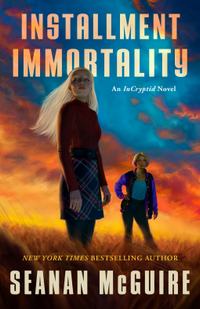 Installment Immortality
Installment Immortality
DETAILS: Series: InCryptid, #14 Publisher: Tor Books Publication Date: March 11, 2025 Format: eARC Length: 432 pg. Read Date: February 12-17, 2025

Obviously, there are some spoilers about the previous novel in the series, Aftermarket Afterlife to follow. And, you could probably say the same for the series as a whole. Take that into consideration if you read beyond the period at the end of this sentence.
What’s Installment Immortality About?
In the months that it took Mary to put herself back together after the attack on their training headquarters, the Covenant hasn’t been quiet. In fact, as they knew a ghost was involved in the attack, some of them have been targeting ghosts up and down the East Coast.
The anima mundi, still rebuilding its control, recruits (to put it nicely) Mary to stop them and rescue what ghosts she can. Mary gets permission to bring along some help from her family (the kind of help that can’t, say, get stuck in a ghost jar)—she doesn’t intend to, but she ends up bringing along Elsie and Arthur who have a need to do something, anything, to help them move on from their mother’s death.
So begins a cross-country trip filled with more danger than they expect (and they expect a lot).
More Mary
This book, like its predecessor, has done a fantastic job of showing the place of Mary in this family. She’s far more than just a quick message-delivery-system, or a genie that can show up at just the right time (she never really came across that way, but it’d be easy to see her filling those roles). It’s both heart-warming and heart-tugging.
She’s also changed a lot—thanks to Annie’s intervention at the Crossroads, and because of her new/growing relationship to the anima mundi. And there are more changes on the horizon—which will be fun to watch as people like me have become more invested in her after the last book.
I thought I had several things to say about Mary here, but just about all of them would need to be redacted. I really enjoyed our time with her, and while I expect that we’re going to be spending a few books focused on other characters after this one (Verity or Elsie are my guesses, which means it’ll probably be Alex), I’m looking forward to seeing what this new part of her life—ahem, afterlife—brings us.
Elsie and Arthur
Poor Arthur—I thought I had a pretty good handle on what was going on with him after the last book, but of course, there’s a lot more afoot than we could’ve known. With plenty of time with him—to see him interact with Mary and his sister, we get to hear a lot more from him and understand things from his perspective.
Then we learn even more from some outsiders. We’re going to have to spend some more time with Arthur soon, because leaving him where McGuire did is not comfortable.
Elsie, on the other hand, surprised me. I figured that like with Alex and Annie—and even the babysitter—when she got a chance to shine, she’d step up and show herself to be exactly the kind of kick-ass heroine that the Prices and Healys seem to specialize in. I won’t get into details, but she’s not cut from the same cloth as her cousins—but that doesn’t mean she should be taken lightly. It’s just that there’s an element of diversity even here that I wasn’t expecting, and I’m glad to see. I think it would’ve been boring to see her transform into a variation of Verity or Alice.
More interestingly than that for her was seeing her relationship with Arthur and how she’s reacting toward the Aeslin mice in their home.
So, what did I think about Installment Immortality?
This was a little bit of a let-down after the Aftermarket Afterlife. It was primarily a follow-up to it, tying up loose ends and getting us all ready for whatever is next. As such, it’s not going to be as good, it can’t be as powerful, and it should help the reader catch our breath. Also, saying it’s not quite as good as one of the best books in this series is not much of an insult.
But, oh man…there were so many things that are great about this book. For one example, there’s a conversation between Mary and one of the Aeslin Mice that is incredibly strange. And if you remember that we’re talking about a conversation between a ghost and a sentient, talking mouse with a perfect memory…strange should be expected. Not this level of it.
Of course, we get to meet new Cryptids, and more than a few ghosts. Their perspectives on the Prices, on the war with the Covenant, on Mary and the Crossroads (many don’t believe the Crossroads are gone, for example), and so on, are fascinating. It’s a good reminder—that we occasionally get, but not as strongly as we do here—how much people don’t instinctively trust this family. But we also get a variety of reactions to them along those lines.
This was very satisfying in terms of long-term character arcs, the war arc, and so on. Installment Immortality was also satisfying on its own terms. There’s some good supernatural, ghosty action. Some good reminders that the dead should not be messed with. Strong character development—no one leaves this book the way they came in. And some sweet moments that remind you that everyone can use a dog in their life.
This is not a book to jump into the series with, unless you want to spend a lot of time confused—Aftermarket Afterlife would function far better for that (as would starting at the beginning). But for long-term fans, this is exactly what they were looking for.
Disclaimer: I received this eARC from Tor Publishing Group via NetGalley in exchange for this post which contains my honest opinion—thanks to both for this.

This post contains an affiliate link. If you purchase from it, I will get a small commission at no additional cost to you. As always, the opinions expressed are my own.
![]()



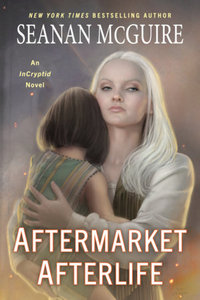

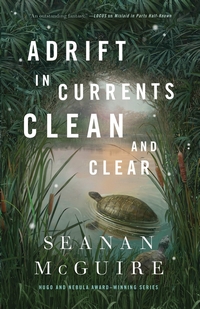
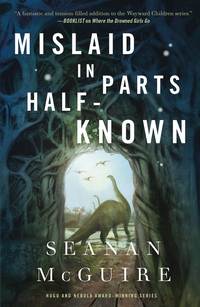
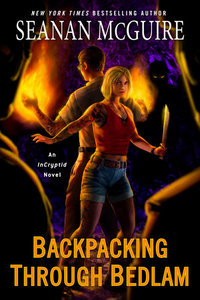

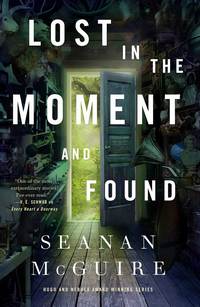


 Grab a book, any book.
Grab a book, any book.